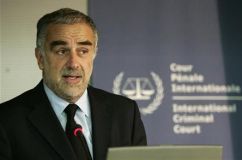ICC plans Darfur indictments by February
Dec 13, 2006 (UNITED NATIONS) — The prosecutor of the International Criminal Court plans to indict suspects for atrocities in Darfur by February, nearly two years after the U.N. Security Council asked him to probe the Sudan region.

In a report ahead of his address on Thursday to the council, prosecutor Luis Moreno-Ocampo said his office was preparing submissions for arrest warrants to judges of the ICC’s pretrial chamber.
“We are planning to complete this work no later than February,” Moreno-Ocampo, an Argentine, said in the report, obtained by Reuters.
Arrest warrants are equivalent to indictments at the ICC, the world’s first permanent criminal court based in The Hague, Netherlands.
Moreno-Ocampo said that since the start of the investigation, his team has carried out more than 70 missions to 17 different countries and conducted more than 100 interviews, many of which were with victims of crimes in Darfur.
But he said that due to the violence in Darfur, he interviewed witnesses outside of Sudan, an arduous task.
Evidence, the report said, included rape, torture, willful murder, sexual violence and torture in Darfur, where at least 200,000 people have been killed and 2.5 million have been displaced in fighting among rebels and government forces since 2003.
The ICC can only prosecute suspects when national courts have failed to do so. Moreno-Ocampo said Sudan so far had not conducted trials for the most serious crimes “and those who bear the greatest responsibility for those crimes.”
VISITING SUDAN IN JANUARY
But he said he was traveling to Sudan again in January to get information on the arrest of 14 people accused of crimes in Darfur and hoped Khartoum would let him talk to the suspects.
Louise Arbour, the U.N. high commissioner for human rights, organized a probe in Darfur two years ago and came up with a list of suspects, including Sudanese officials, military and rebel leaders. Moreno-Ocampo said her evidence had been preserved.
Since Moreno-Ocampo organized his staff in 2003, he has indicted four leaders of Uganda’s brutal Lord’s Resistance Army and one Congolese, the only one arrested.
But some of the court’s most ardent supporters, at a meeting last month, voiced concern that he was treading too carefully and could undermine a dream of a permanent tribunal, under discussion since the Nazi trials at Nuremberg at the end of World War Two.
In the case of Sudan, it will be nearly impossible to arrest the perpetrators, unless the government does so.
But Richard Dicker, director of the Human Rights Watch’s international justice program, says an arrest warrant by itself serves as a powerful warning.
“The impact, the stigmatization of charges, is no small thing,” he told Reuters. “Branding suspects as a charged war criminal has a major effect on their legitimacy.”
While it was “shameful” that Radovan Karadzic and Ratko Mladic were never arrested for war crimes in Bosnia despite charges by a special U.N. court, he said, the indictments had served a purpose.
“They marginalized them as political actors in the former Yugoslavia,” Dicker said. “They stripped them of political legitimacy.”
The Bush administration has strongly objected to the court, fearing frivolous politically motivated indictments, which have not occurred. Russia too had worries — it signed the statutes but did not ratify them. China never signed.
“We are prosecutors enforcing a law that has no consensus,” Moreno-Ocampo told the meeting of advocacy and human rights groups last month.
(Reuters)
